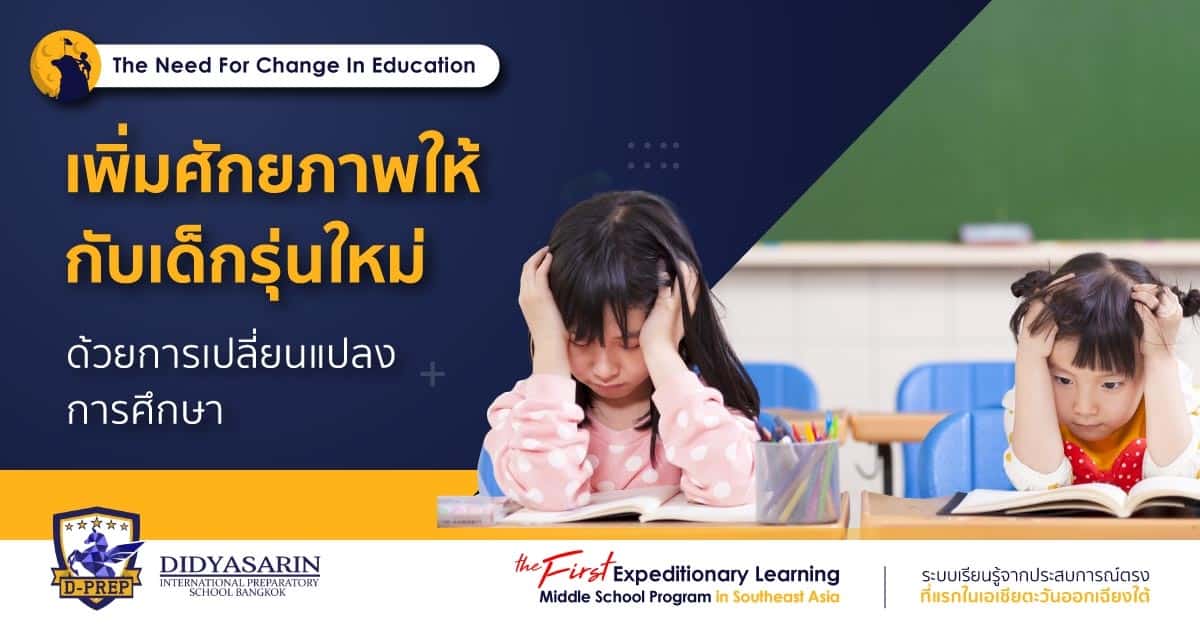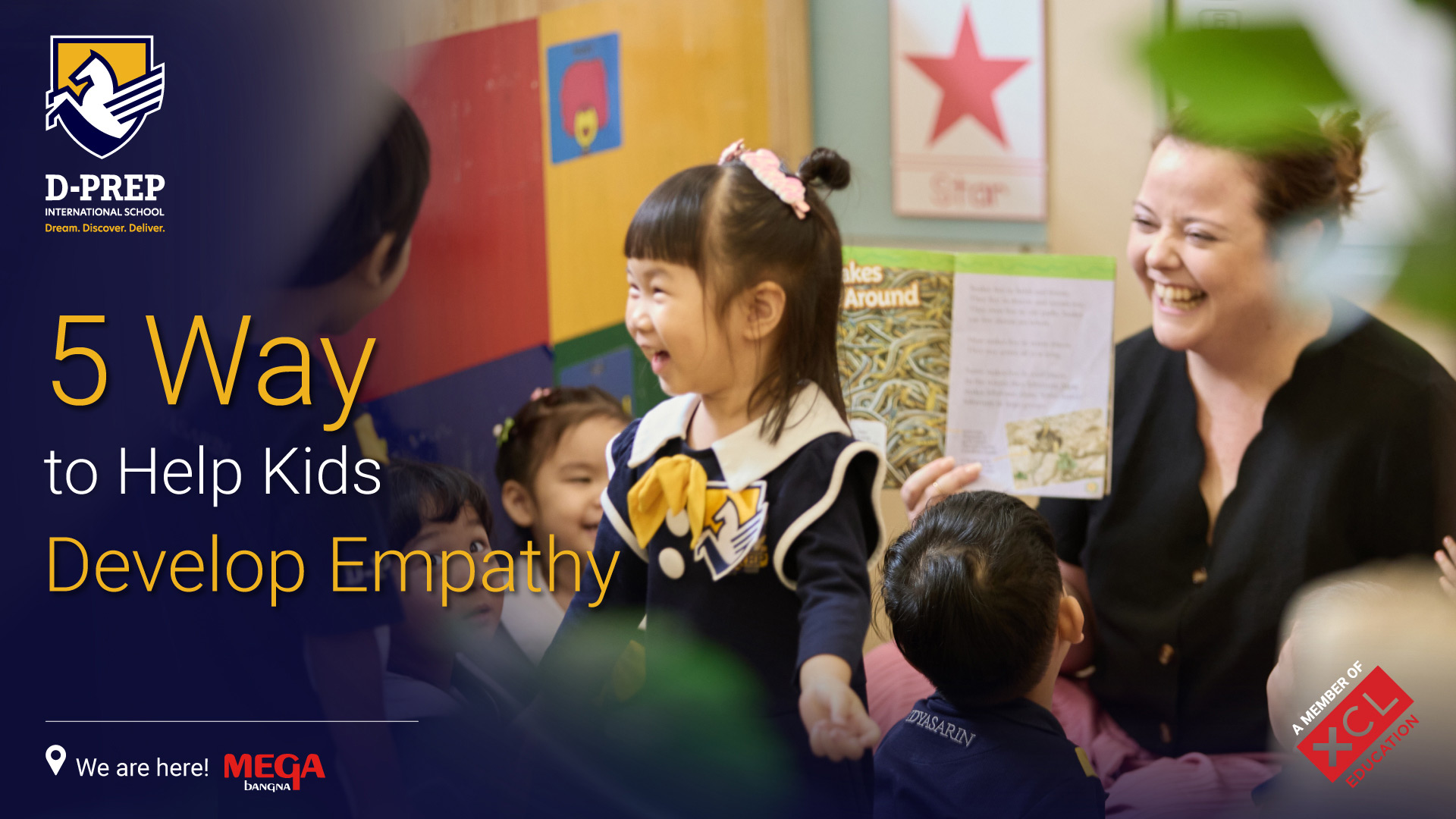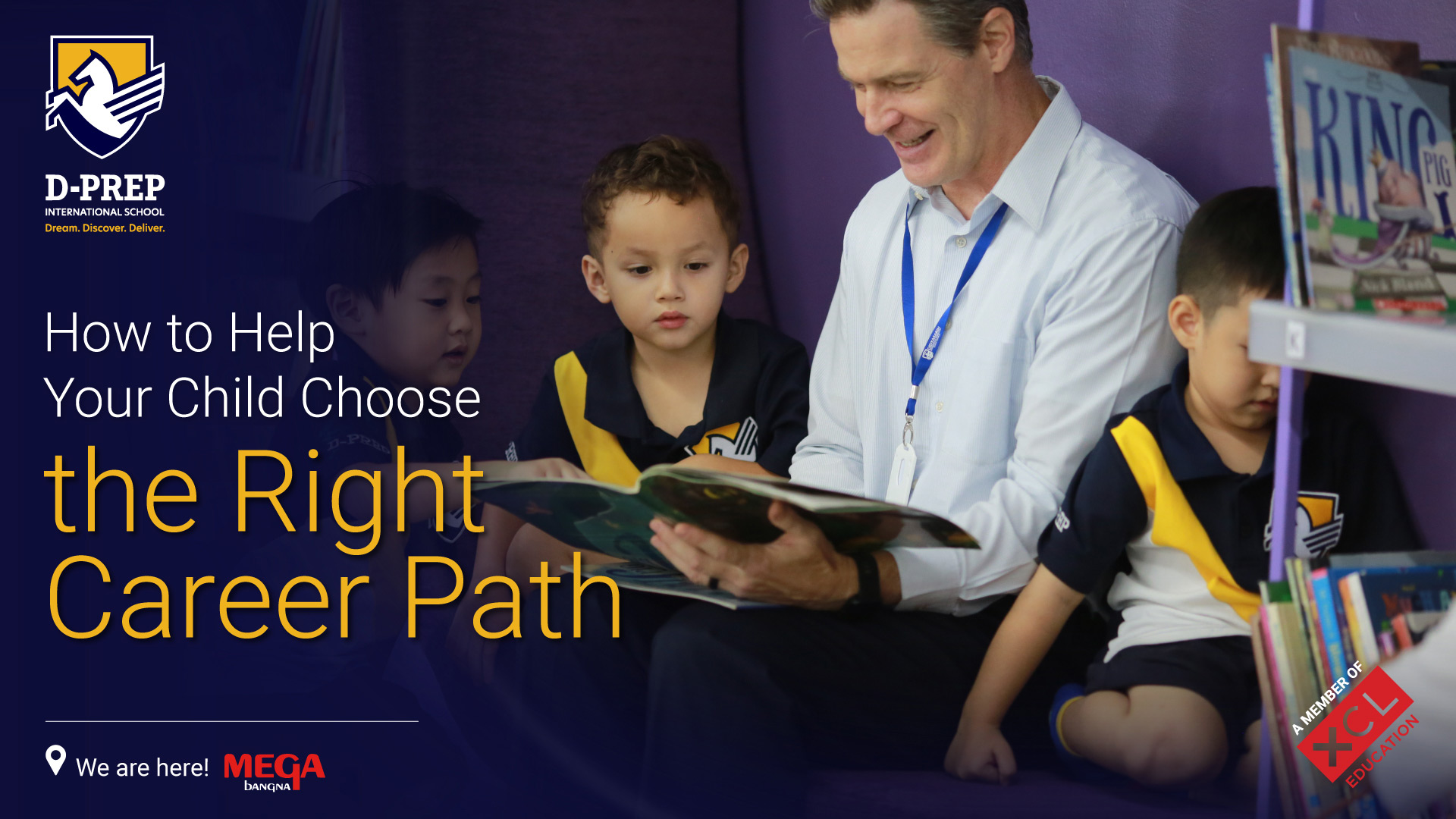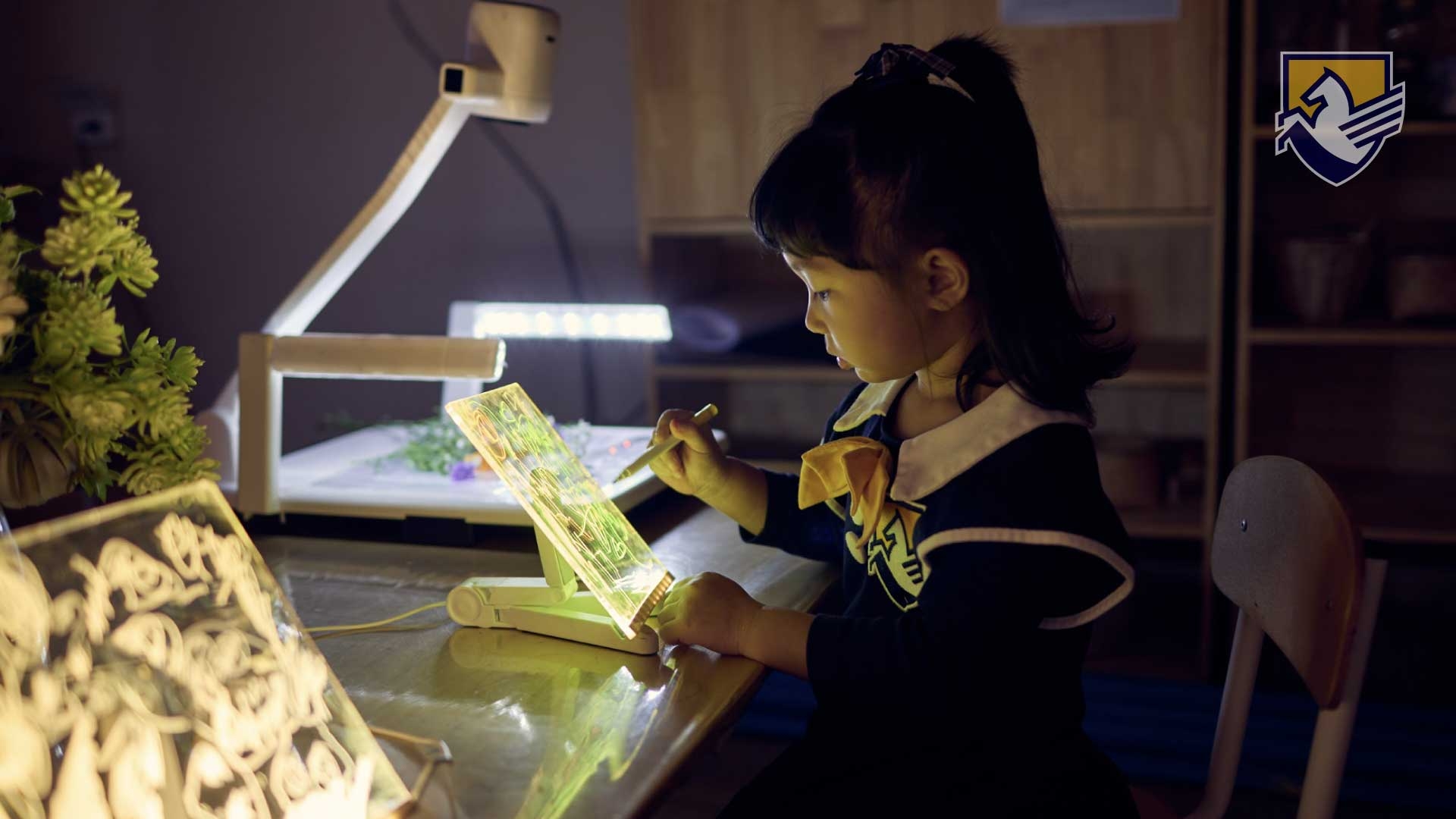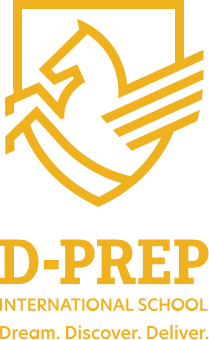ในปัจจุบันโลกเปลี่ยนแปลงไปอย่างมาก ตรงกันข้ามกับระบบการศึกษาเกือบทั่วโลก ที่แทบไม่มี การเปลี่ยนแปลงทางการศึกษา ในขณะที่เด็กเกิดและโตในยุคสมัยใหม่ แต่ระบบการศึกษายังเป็นระบบเดิมที่ไม่มีการเตรียมพร้อมหรือพัฒนาทักษะที่จำเป็นให้กับพวกเขาเลย ซึ่งอาจก่อให้เกิดปัญหาได้ เนื่องจากสภาพแวดล้อม สังคม รวมถึงทักษะความรู้ต่างๆ นั้นมีความซับซ้อนมากขึ้นเรื่อยๆ ตามยุคสมัยที่เปลี่ยนแปลง ดังนั้นระบบการศึกษาแบบเดิมอาจจะไม่ตอบโจทย์อีกต่อไป เพราะฉะนั้นการเปลี่ยนแปลงการศึกษา จึงเป็นเรื่องสำคัญ
การเปลี่ยนแปลงทางการศึกษา ช่วยพัฒนาศักยภาพเด็กรุ่นใหม่ได้อย่างเต็มที่ ด้วย 4 ปัจจัยนี้
1. การผสมผสานการสอนเชิงวิชาการ และทักษะความคิดสร้างสรรค์อย่างเหมาะสม และสามารถนำไปปรับใช้จริงได้ทั้งในโรงเรียน ในชีวิตประจำวัน และการศึกษาในอนาคต ช่วยให้เกิดการเปลี่ยนแปลงทางการศึกษา
ปฏิเสธไม่ได้ว่าภาษาและคณิตศาสตร์มีความสำคัญต่อการศึกษาของเด็กนักเรียน แต่ก็ยังมีทักษะอื่นที่สำคัญไม่แพ้กัน โดยเฉพาะในด้านของความคิดสร้างสรรค์
ดังที่คุณ Ken Robinson ได้กล่าวในหัวข้อ TED Talk “Do Schools Kill Creativity? (โรงเรียนทำลายความคิดสร้างสรรค์ให้หมดไปจากตัวเด็กหรือไม่?) เขาได้กล่าวถึงการที่เด็กแต่ละคนเกิดมาพร้อมกับความสามารถที่จะพัฒนาทักษะต่างๆ ของตนเองได้อย่างมากมาย แต่ระบบการศึกษาในรูปแบบเดิมนั้นกลับทำให้เด็กไม่มีโอกาสได้พัฒนาและต่อยอดทักษะเหล่านั้นของตนเอง
ใครที่เคยเก่งเลขที่โรงเรียน? ใครกันที่เก่งภาษา?
หรือใครบ้างที่ไม่เก่งทั้งเลขและภาษา?
แม้ว่าคุณอาจจะมีความสนใจและมีความสามารถในด้านอื่นๆ มากมาย แต่อาจถูกมองข้ามที่จะเป็น “คนเก่ง” ในสายตาของการศึกษาระบบเก่า ซึ่งในความเป็นจริงแล้วการที่โลกของเราจะขับเคลื่อนและดำเนินไป ต้องอาศัยกลุ่มคนที่มีความสามารถในหลากหลายด้าน ไม่ใช่เพียงแค่คนที่เก่งเลขและภาษาอย่างเดียวเท่านั้น ไม่เช่นนั้นทุกวันนี้เราคงไม่มีเชฟที่ทำอาหาเลิศรส ไม่มีนักออกแบบที่น่าทึ่ง หรือแม้กระทั่งไม่มีการกำเนิดของธุรกิจใหม่ๆ ที่น่าสนใจอีกหลายอย่าง
ในชีวิตจริงเมื่อสำเร็จการศึกษาและเข้าไปสู่การทำงานนั้น คนเราต้องใช้ทักษะหลากหลายด้าน ในการทำงานและใช้ชีวิตได้อย่างมีประสิทธิภาพ
ตัวอย่างเช่น : ศัลยแพทย์จะเปลี่ยนโลกของการรักษาให้ก้าวหน้าไปอีกขั้น จะต้องใช้ทั้งทักษะทางวิชาการและทักษะจินตนาการ เพื่อให้เกิดการคิดค้นเครื่องมือและการรักษาแบบใหม่ รวมไปถึงต้องใช้ทักษะทางสังคมในการพูดคุย จัดการต่อความรู้สึกความเจ็บปวด อีกทั้งยังต้องใช้ทักษะความเป็นผู้นำในการนำทีมการรักษาอีกด้วย
ดังนั้นโรงเรียนจึงมีความจำเป็นต้องเปลี่ยนแปลงการศึกษา หันมาสร้างระบบการเรียนการสอนแบบ “สหวิทยาการ” (Interdiscipinary Approch) ขึ้น เพื่อสอนให้เด็กเล็งเห็นถึงความสำคัญ การเชื่อมโยง ปรับใช้แต่ละศาสตร์ และสร้างความสนุกสนานในการผสมผสานทักษะต่างๆ เข้าด้วยกัน
ปัจจุบันในแต่ละโรงเรียนนิยมให้เด็กศึกษาและจัดทำเป็นโครงการที่เด็กมีความสนใจ อยากรู้อยากศึกษาในเรื่องนั้นๆ อย่างแท้จริง ซึ่งจะนำไปสู่การค้นคว้าหาคำตอบ และการค้นหาทางแก้ไขปัญหาด้วยตัวเอง ซึ่งรูปแบบการเรียนการสอนแบบนี้เป็นที่รู้จักในนาม “Project/ Problem Based Learning” (การใช้โครงการ และปัญหาเป็นพื้นฐานการเรียนรู้)
โดยทาง D-PREP เรามีหลักสูตร Expeditionary learning คือ หลักสูตรที่เน้นให้เด็กนักเรียนค้นคว้าหาความรู้เชิงลึก (in-depth research) และทดลองทำด้วยตัวเอง ในรูปแบบของการสร้าง project ต่างๆ โดยการเรียนการสอนแบบ EL นั้น ผู้เรียนจะได้เข้าไปมีส่วนร่วมอย่างแท้จริงทั้งในแง่การพัฒนาทักษะ พัฒนาโปรเจคนั้นๆ ให้เกิดขึ้นได้จริง รวมถึงการได้เข้าไปฝึกการทำงานอย่างเข้มข้นกับทีมผู้มีประสบการณ์ ทำให้ผู้เรียนได้รับประสบการณ์ตรง และได้สำรวจตัวเองว่ามีความชอบในสายงานนั้นจริงๆ หรือไม่ เรียกได้ว่าระบบการสอนแบบ EL นั้นมีความเข้มข้น เป็นการเรียนรู้เชิงลึกที่เหมาะสำหรับเด็กโตและตอบโจทย์เด็กยุคใหม่อย่างแท้จริง

2. การเปลี่ยนแปลงทางการศึกษาจะไม่เกิดประสิทธิภาพ หากผู้เรียนไม่มีใจรัก ไม่ได้รู้สึกสนุกต่อการเรียน แม้จะทราบดีว่าการเรียนนั้นๆ สำคัญกับพวกเค้าอย่างไร
เราอาจมีข้อสงสัยว่า ในอดีตเราเรียนอะไรไปตั้งมากมายแต่ทำไมกลับไม่เคยได้ใช้ประโยชน์เลย? แท้จริงแล้วสิ่งที่คุณได้เรียนนั้นหลายส่วนเป็นสิ่งที่สำคัญและจำเป็น แต่ขาดความเข้าใจว่าสิ่งที่กำลังเรียนอยู่นั้นสามารถเชื่อมโยงและนำไปต่อยอดการใช้งานในอนาคตได้อย่างไร
แต่สิ่งที่สำคัญคือ การเรียนรู้ควรเกิดขึ้นจากใจที่รัก อยากรู้อยากเห็น มีการตั้งคำถามมากมายเกี่ยวกับสิ่งๆนั้น รวมไปถึงการทำความเข้าใจว่าสิ่งที่กำลังเรียนอยู่นั้นสามารถนำไปใช้อะไรได้บ้าง ถึงแม้ในบางเรื่องจะเป็นเรื่องที่เราไม่ค่อยชอบก็ตาม แต่เราจะมีใจที่จะอยากเรียนรู้มากขึ้น ถ้าหากเราพบว่าสิ่งนั้นจะนำไปใช้ให้เกิดประโยชน์และช่วยเหลือผู้อื่นได้อย่างไร
ไม่เช่นนั้นแล้วสิ่งที่คุณครูได้พร่ำสอน ก็คงเปรียบกับสำนวนที่ว่า “เข้าหูซ้าย ทะลุหูขวา” เรียนแล้วก็ลืม เพราะฉะนั้นโรงเรียนควรสอนสิ่งที่จำเป็นต้องสอน ไปพร้อมกับการสอนในสิ่งที่เด็กอยากเรียน หรือกระตุ้นให้เด็กอยากเรียนในสิ่งที่จำเป็นเพื่อให้เกิดประโยชน์สูงสุด
3. ให้ผู้เรียนได้เป็นตัวของตัวเอง ค้นหาตัวตนโดยปราศจากความกลัวที่จะทำผิดพลาด
แนวคิดที่น่าสนใจคือ การผสมผสานระหว่างความรู้เชิงวิชาการและอิสระทางความคิด ช่วยให้เกิดการเปลี่ยนแปลงด้านการศึกษา
ประเทศฟินแลนด์ประสบความสำเร็จเป็นอย่างมากสำหรับการ “เล่น 50% เรียน 50%” โดยปล่อยให้เด็กยังคงได้เป็นเด็ก มีความอยากรู้อยากเห็นและมีจินตนาการ เรียนรู้การแก้ปัญหาด้วยตัวเอง ได้รับการส่งเสริมช่วยเหลือในสิ่งต่างๆ โดยปราศจากการบังคับ การได้อยู่ในสิ่งแวดล้อมที่ปลอดภัยและเหมาะสม โดยคุณครูมีส่วนช่วยสนับสนุน ซึ่งเป็นองค์ประกอบของการเรียนรู้ที่ดีที่สุดที่จะทำให้เด็กได้ทดลอง เจอความผิดพลาด และได้เรียนรู้จากความผิดพลาดนั้นด้วยตัวเอง
หลาย ๆ ท่านอาจจะยังไม่เข้าใจว่าความผิดพลาดนั้นสำคัญต่อการเรียนรู้อย่างไร เพราะผู้ใหญ่มีความปรารถนาดีต่อเด็ก กลัวเด็กจะรู้สึกแย่จากการที่ต้องพบเจอความผิดพลาด กลัวว่าเด็กจะรู้สึกว่าตัวเองดีไม่พอ ความรู้สึกกลัวนี้ทำให้ผู้ปกครองเข้มงวดและผลักดันลูกหลานให้ประสบความสำเร็จมากขึ้น โดยที่เราอาจจะลืมตั้งคำถามกับตัวเองว่า “สิ่งที่เข้มงวดอยู่นั้นจำเป็นจริงๆ แล้วหรือ?”
คุณครูควรชื่นชมเมื่อตอนที่เด็กผิดพลาดด้วย เพราะนั่นคือสิ่งที่ยืนยันว่าเด็กได้พยายามแล้ว ไม่ชื่นชมเพียงแค่ตอนสำเร็จ นั่นจะทำให้เด็กไม่กลัวที่จะได้พยายาม ทำให้เค้าได้เรียนรู้ว่า ไม่ว่าเค้าจะทำสำเร็จหรือล้มเหลว สิ่งที่สำคัญที่สุดคือ “ความพยายาม” และการได้เรียนรู้ระหว่างนั้นนั่นเอง
ทาง D-PREP มีหลักสูตรการเรียนแบบ Play-based learning หรือ การเรียนรู้ผ่านการเล่น ทำให้เด็กได้เรียนรู้ทักษะ การเข้าสังคม การพัฒนาร่างกาย ได้ฝึกฝน และพัฒนาทางด้านความคิด ในขณะเล่นเด็กจะได้สำรวจ คิดสร้างสรรค์ แก้ไขปัญหา เผชิญกับความท้าทาย และใช้จินตนาการอย่างเต็มที่ หรือแม้กระทั่งการเลือกใช้แนวคิดการเรียนการสอนแบบ Reggio Emilia ที่เป็นแรงบันดาลใจให้กับโรงเรียนของเรา ซึ่ง Reggio Emilia คือ ระบบการศึกษาเชิงผสมสำหรับเด็กปฐมวัย มีแนวคิดที่สำคัญคือ การเรียนรู้ของเด็กจะสามารถพัฒนาได้อย่างมีประสิทธิภาพ

4. ไม่ว่าโลกเปลี่ยนแปลงไปในทางไหน คุณครูควรสอนทักษะที่จำเป็น เกี่ยวข้อง มีประโยชน์และประยุกต์ใช้ได้จริงอยู่เสมอ
โรงเรียนควรมีเอกลักษณ์ของตนเองเหมือนกับผู้ปกครองแต่ละบ้านที่จะมีเอกลักษณ์ของตนเองเช่นกัน โรงเรียนควรจัดสรรระบบการศึกษาที่ตอบโจทย์และเข้ากันกับตัวตนของเด็กแต่ละคนที่ต่างก็มีความหลากหลาย เนื่องจากระบบการศึกษาเดียวที่ใช้กับทุกครอบครัวจะไม่ได้ผลอีกต่อไป
ดังนั้นโรงเรียนควรสร้างสรรค์ระบบการเรียนรู้ใหม่ๆ เพื่อตามให้ทันการเปลี่ยนแปลงการศึกษา โดย
- ให้ความสำคัญกับการเข้าใจตัวตนของนักเรียนเอง และสามารถตัดสินใจเกี่ยวกับอนาคตของตัวเองได้
- ส่งเสริมให้เด็กสามารถประยุกต์ใช้องค์ความรู้นั้นๆ ให้เกิดประโยชน์ในชีวิตจริง
- พัฒนาตัวตนและทักษะชีวิตในภาพรวมโดยไม่สอนแต่ทักษะทางวิชาการเพียงอย่างเดียว
โรงเรียนควรสร้างความหลากหลายเพื่อตอบโจทย์ในแต่ละครอบครัวของผู้เรียน มีการพัฒนาตัวเองและอัปเดตข้อมูลให้ทัดเทียมโลกและสังคมปัจจุบันอยู่เสมอ ไม่เช่นนั้นเราจะไม่สามารถสร้างนักเรียนที่จะเป็นบุคลากรที่จะพัฒนาธุรกิจและสิ่งใหม่ๆ ต่อไปในอนาคตได้เลยการเปลี่ยนแปลงทางการศึกษาให้เป็นรูปแบบใหม่ ควรมองผู้เรียนในองค์รวมไม่เพียงเฉพาะพื้นฐานทางวิชาการ แต่มอบทักษะที่จำเป็นต่อการใช้ชีวิตในอนาคต อย่างครบถ้วนในทุกๆองค์ประกอบของชีวิต ไม่ว่าจะเป็นทักษะการใช้ชีวิต (Life Skill) การแก้ปัญหา การพัฒนาตัวเอง การเรียนรู้จากความผิดพลาด และทักษะในการคิดอย่างสร้างสรรค์ เพื่อสร้างเด็กที่พร้อมจะเติบโตอย่างมีศักยภาพ ครบถ้วนสมบูรณ์พร้อมในทุกๆ ด้าน พวกเขาจะได้เรียนรู้การพัฒนาตนเองอย่างไม่หยุดนิ่ง และได้ออกไปเปลี่ยนแปลงสิ่งต่างๆ รอบตัวให้ดีขึ้น เพื่อตัวของพวกเขาเอง เพื่อสังคมและเพื่อโลกใบนี้อีกด้วย
หากท่านสนใจเข้าเยี่ยมชมโรงเรียนสามารถติดต่อได้ที่
Address :
D-PREP International School
38, 38/1-3, 39, Moo 6,
Bangna Trad Rd., Km. 8,
Bang Kaeo, Bang Phli District,
Samut Prakan, Thailand 10540
Email: info@didyasarin
Google Map: https://info.dprep.ac.th/directions
เบอร์ติดต่อ: 02-105-1757, 082-1515922
Website : www.dprep.ac.th
Facebook: DprepSchool
Line: @d-prep
IG : @dprepschool

